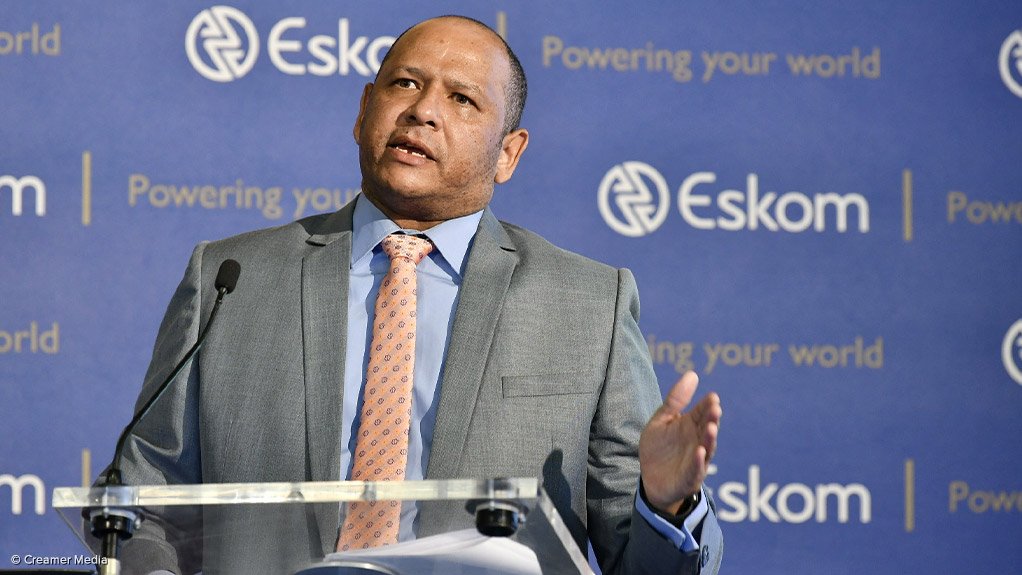Eskom has warned that it is likely to report another R23-billion-plus loss for its current financial year to the end of March 2024, having belatedly confirmed a loss of R24-billion (R12-billion) for its 2022/23 financial year, during which loadshedding was implemented on a record 280 days.
Acting CEO Calib Cassim confirmed the dismal outlook during the release of the group’s results presentation, held seven months after the group’s official year-end. As with several previous reports, the statements were also qualified by the State-owned utility’s auditors.
The outlook remains clouded by loadshedding, which intensified at the start of the current financial year, with more than 200 days of rotational power cuts having already been implemented since April 1, at times at levels as high as Stage 6.
Cassim indicated that it would be a tall order for Eskom not to breach the 280 days of loadshedding declared in 2022/23 during the current financial year. In 2021/22, 65 days of loadshedding were implemented.
The poor generating performance was reflected both in a decline in sales volumes and a surge in the cost of running both Eskom’s diesel-fuelled open-cycle gas turbines (OCGTs) and those operated by independent power producers (IPPs).
Acting CFO Martin Buys reported that sales fell 5% to 188 401 GWh from 198 281 GWh and that sales were expected to fall again in the current financial year to about 185 300 GWh.
He reported that OCGT costs across the Eskom and IPP fleet had increased to nearly R30-billion during the period to produce some 4 100 GWh, up from about R15-billion to produce about 2 700 GWh. The average diesel price increased from around R18/l in April 2022 to R23/l by March 2023.
Eskom insisted, however, that it would not exceed its R28.5-billion OCGT budget for the current financial year.
The sales slump was offset on top line by the fact that Eskom received a 9.61% tariff hike during the year, which supported an increase in revenue to R259.5-billion from R247.5-billion in the prior period.
Unit costs of production rose across the board, however, apart from the unit costs of Eskom’s renewable-energy purchases, which fell 2%, as the lower-cost plants procured in the more recent public procurement rounds began contributing energy.
The group’s overall primary energy costs rose to R154.9-billion from R132.9-billion, while production slumped to 217 918 GWh (230 161 GWh), raising overall unit costs to R711/MWh (R578/MWh).
Cassim said the tariff award of 18.65% on April 1 this year would not be sufficient to offset the decline in sales and the poor operational performance of the coal fleet for much of the current year.
The group’s energy availability factor (EAF) fell to 56% during the 2022/23 financial year and until recently breakdowns across the aged coal feel had resulted in an EAF of below the 60% target set for the end of March 2023. A target of 65% has been set for the current financial year.
“The financial outlook for 2024 continues to be negatively affected by poor operational performance,” Cassim said, while insisting that the Generation Recovery Plan approved by the board at the start of the current financial year was starting to yield improvements.
DEBT RELIEF & RESTRUCTURING
New chairperson Mteto Nyati said the operational recovery was one of six priorities being pursued by the current board, with the others being: the stabilisation of the leadership team, including the appointment of a new permanent CEO; intensifying the fight against fraud, corruption and criminality; implementing the restructuring of Eskom, including operationalising the National Transmission Company South Africa (NTCSA) by the start of the new financial year; strengthening the balance sheet further following the R254-billion debt-relief package extended by the National Treasury; and intensifying stakeholder management.
Nyati reported that the names of three appointable CEOs had been handed to the Public Enterprises Department “last week” and that the appointment would follow the completion of the government processes.
The debt-relief extended by the National Treasury, he added, had already helped Eskom improve its planning for the maintenance of the aged fleet and, by the end of the three-year debt-relief period would support a decline in the group’s debt from R424-billion to R270-billion.
The debt would be held by Eskom Holdings but allocated across the transmission, distribution and generation subsidiary companies.
The unbundling of NTCSA and the National Electricity Distribution Company of South Africa (NEDCSA) were progressing, while the unbundling of generation was dependent on establishing and operationalising a new holding company, which was required to take advantage of a large assessed loss.
While NTSCA’s three licences have been approved by the National Energy Regulator of South Africa, it was still awaiting the actual licences, as well as lender consent, which was expected by the end of November, and designation as the buyer by the Department of Mineral Resources and Energy.
The appointment of the NTCSA independent board had been delayed, Nyati revealed, by the fact that three board candidates had indicated their nonavailability.
Nevertheless, Eskom still expects the company to be operational ahead of April, but no longer anticipated that the NEDCSA would be established by that date.
EMAIL THIS ARTICLE SAVE THIS ARTICLE ARTICLE ENQUIRY
To subscribe email subscriptions@creamermedia.co.za or click here
To advertise email advertising@creamermedia.co.za or click here











